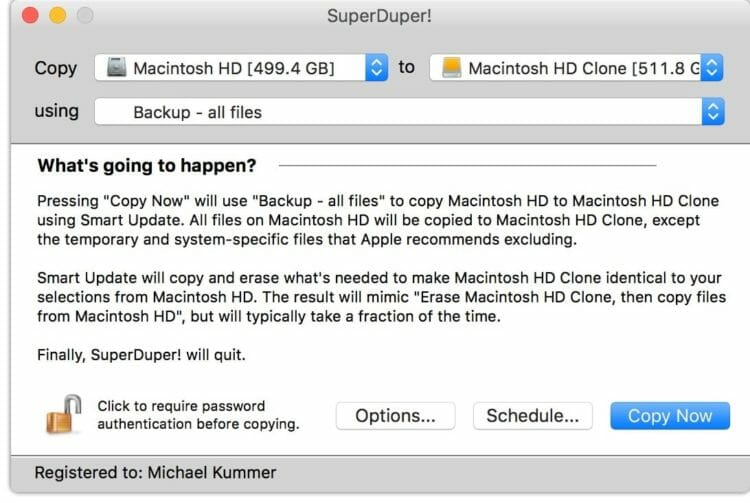

- #WILL I LOSE MY FILES IF I INSTALL NEW MAC OS WINDOWS 10#
- #WILL I LOSE MY FILES IF I INSTALL NEW MAC OS ISO#
- #WILL I LOSE MY FILES IF I INSTALL NEW MAC OS DOWNLOAD#
- #WILL I LOSE MY FILES IF I INSTALL NEW MAC OS WINDOWS#
#WILL I LOSE MY FILES IF I INSTALL NEW MAC OS ISO#
As with the ISO name, here WINUSB is the volume label I gave to my USB drive when erasing it with Disk Utility. “/Volumes/WINUSB/sources/install.swm” the destination of where the split files should end.Just do ls /Volumes from the terminal to see what is there. Keep in mind that the name under /Volumes depends on the ISO name so you need to adjust this accordingly. “/Volumes/CCCOMA_X64FRE_EN-GB_DV9/sources/install.wim” which is the source file to split.“split” to indicate that we want to split this larger file.

In the command above, we told to execute the wimlib-imagex tool (part of Wimlib) and passed some arguments: Splitting WIM: 4654 MiB of 4654 MiB (100%) written, part 2 of 2įinished splitting "/Volumes/CCCOMA_X64FRE_EN-GB_DV9/sources/install.wim" In the same or a new Terminal session, execute the following: ~ % wimlib-imagex split /Volumes/CCCOMA_X64FRE_EN-GB_DV9/sources/install.wim /Volumes/WINUSB/sources/install.swm 4000 Now that we have Wimlib installed, we can use it to split the large install.wim file and copy it to our USB drive. 🍺 /usr/local/Cellar/wimlib/1.13.4: 65 files, ~ % Split install.wim and get it on the USB drive Once Brew is installed, we can use it to install Wimlib: ~ % brew install wimlib => Checking for sudo access (which may request your password). As is instructed on the Brew website, copy and paste the mentioned line in a terminal and execute it. So, as just mentioned, we start by installing Brew. The easiest way to get this installed on your Mac is by using Brew (). This is a tool that is developed to work with, and modify. To accomplish this, we can use Wimlib ().
Unfortunately we have to work around that by splitting the file in two parts, smaller than the limit of our file system on the USB drive. So far things were pretty straightforward and if it wouldn’t be for that large file it would be a piece of cake. Then I create the sources folder and copy all files from sources with the exception of install.wim: Prepare to split install.wim I typically start by copying all separate files and folders, except for the sources folder: We will take care of that later so for now, copy all remaining files to the USB drive using Finder. As you can see, the sources folder contains one large file: install.wim which is over 4GB and will not fit on the FAT32-formatted USB drive:
#WILL I LOSE MY FILES IF I INSTALL NEW MAC OS DOWNLOAD#
Once the ISO file is download as well, double click the ISO file to mount it. Copy all smaller files to the USB driveĪfter the previous step, our USB drive is prepared. Finally click “Erase” to complete the process. In the dialog, enter a name for the drive (WINUSB here), choose to format as “MS-DOS (FAT)” and “Master Boot Record” as scheme. Then, on the left side, select your USB drive from the list and click Erase on the top right menu. In Disk Utility, choose to show all devices: Insert the drive in your Mac and start Disk Utility. While the ISO is downloading, we can prepare our USB drive.

iso file on your Mac: Prepare the USB drive
#WILL I LOSE MY FILES IF I INSTALL NEW MAC OS WINDOWS#
When you open this link on macOS, it should show you the ability to download the ISO rather than the Media Creation tool, which is shown when opening the same on a Windows-based PC.Ĭhoose for Windows 10, then select the preferred language, go for the “64-bit Download” and wait for the download to complete to get the. Let’s start by downloading the ISO from Microsoft.
#WILL I LOSE MY FILES IF I INSTALL NEW MAC OS WINDOWS 10#
In case you’re looking for the instructions to create a bootable USB drive to install Windows 11 instead, have a look at the following article: Download the Windows 10 ISO Create bootable Windows 11 installation USB To overcome this, we will need to use a tool, Wimlib, which is able to split this file in two parts. FAT32 has a file size limit of 4GB while the installation ISO now contains one file that is larger. The main reason for this is because macOS supports only FAT32 as filesystem that is compatible with Windows (and ExFat but that causes issues to boot from). Unfortunately, since some time, it became a bit more complicated to create this USB drive from macOS.


 0 kommentar(er)
0 kommentar(er)
